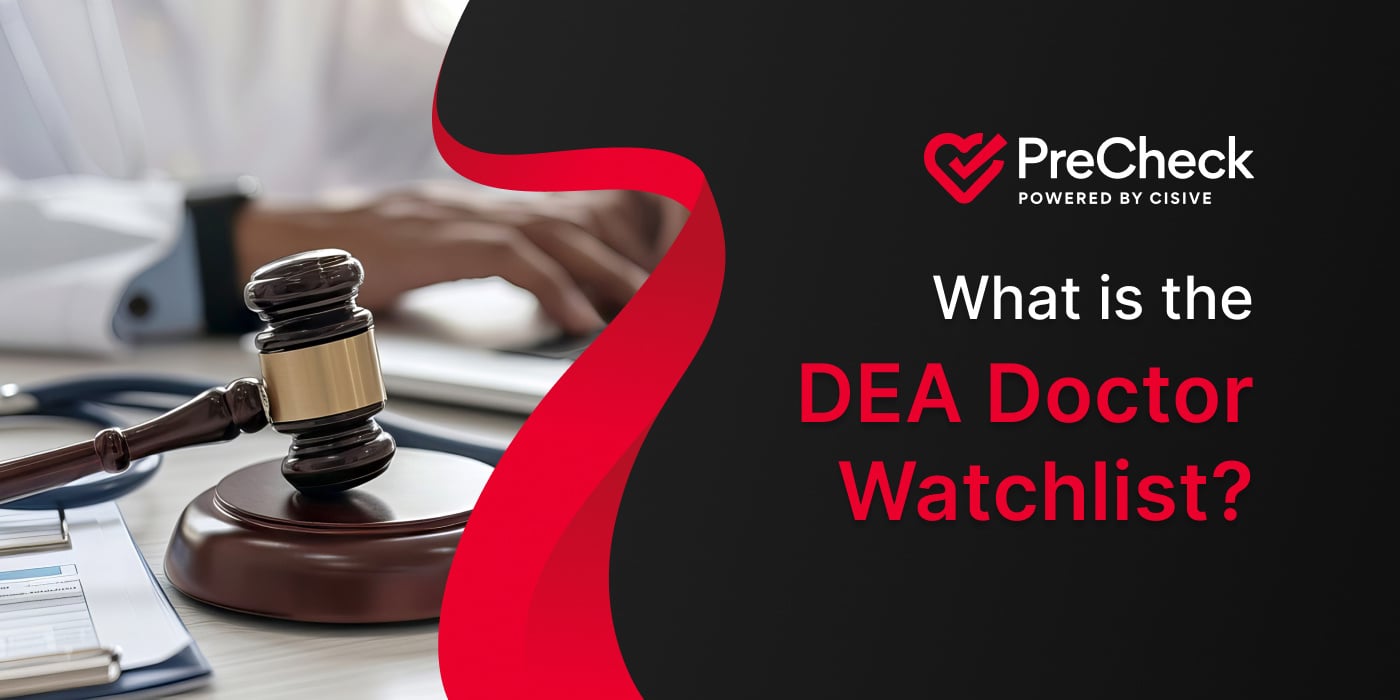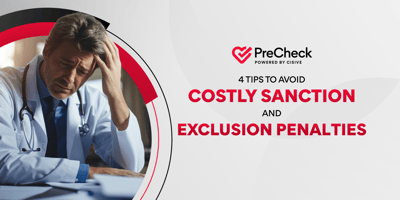

As an organization in the healthcare industry, remaining in compliance with the rules and...

Healthcare organizations have a duty to protect their patients from harm. Whether you work for a hospital or a private medical practice, running thorough background checks is a great way to fulfill your obligations.
Learn more about the Drug Enforcement Administration (DEA) doctor watchlist and find out how you can use it to protect patients and make sure your facility stays in compliance with all applicable laws.
Key TakeawaysHere are the key details you need to know about the DEA Doctor Watchlist.
|
Despite its name, the DEA Doctor Watchlist isn't a formal list of healthcare providers. It's a colloquial term used for two programs in the Office of Diversion Control at the U.S. Department of Justice: Administrative Actions Against Doctors and Criminal Cases Against Doctors.
The U.S. Drug Enforcement Administration (DEA) is one of several agencies overseen by the DOJ. Its mission is to prevent and detect the diversion of controlled substances.
Diversion makes powerful prescription drugs available to people who misuse them, so it's a major contributor to the U.S. opioid epidemic. DEA agents work to prevent diversion while ensuring an adequate supply of controlled substances for the people who need them.
In 1970, Congress passed the Controlled Substances Act, which created standardized schedules for all controlled substances. The DEA and the Department of Health and Human Services (HHS) both have the power to add, delete, or change the schedule of a specific drug.
Officials must consider the following when determining whether to add, remove, or reclassify a drug:
As part of its enforcement efforts, the DEA also maintains a database of all individuals licensed to prescribe controlled substances. The database includes physicians, nurse practitioners, physician assistants, dentists, optometrists, and veterinarians.
Each provider has a unique DEA number, making it easier for officials to track their prescribing habits. Agents monitor the database to determine if any prescribers are engaging in suspicious activities.
For example, a healthcare professional may attract attention from the DEA if they prescribe controlled substances to a large number of out-of-state patients. The DEA is also working to add the following information to its existing database:
DEA agents use the prescriber database, along with other resources, to investigate drug diversion offenses. Officials also investigate each registered prescriber every five years to ensure they're following all laws and regulations related to controlled substances.
Recommended Reading: How You Can Solve the Nursing Shortage
If DEA agents discover that a prescriber has violated one of the provisions of the Controlled Substances Act, they may issue an Immediate Suspension Order or an Order to Show Cause.
An Immediate Suspension Order is more serious than an Order to Show Cause, as it results in the immediate suspension of an individual's prescribing privileges. The DEA issues suspension orders when there is an "imminent danger" to public health or safety due to a prescriber's actions.
An Order to Show Cause compels the recipient to explain why their actions shouldn't result in the denial, suspension, or revocation of their prescribing privileges. In other words, the prescriber has an opportunity to convince the DEA not to move forward with a suspension or revocation.
DEA and HHS officials work to protect the public from unscrupulous healthcare professionals. If you're involved in hiring physicians, physician assistants, or nurse practitioners, it's important to do an exclusions check before you hire a new employee.
The HHS Office of Inspector General (OIG) maintains a database of individuals who aren't permitted to participate in Medicare and other federal healthcare programs. Known as the List of Excluded Individuals/Entities, the database is a valuable resource for hiring managers, HR staff, and third-party recruiters.
Any of the following offenses can land a physician on the exclusions list:
Some offenses, including felony convictions related to the unlawful dispensing of controlled substances, come with mandatory exclusions. An exclusion is mandatory if it's required by law.
Other offenses may lead to permissive exclusions. An exclusion is permissive if HHS officials have some discretion in determining an appropriate resolution.
If an individual commits a misdemeanor involving unlawful dispensing, prescription, manufacture, or distribution of controlled substances, HHS officials may or may not add them to the exclusions database.

The DEA Doctor Watchlist is important because it can help you avoid hiring someone with a history of offenses related to the unlawful manufacture, distribution, dispensing, or prescription of controlled substances.
Here are the key benefits to understand about the watchlist.
Paying attention to the watchlist is essential for protecting patients from harm. Excluded individuals have misdemeanor or felony convictions related to healthcare fraud, patient abuse, controlled substances, or patient neglect.
All of these offenses have the potential to put patients at risk, either physically or financially. For example, a physician who commits healthcare fraud once may commit it again, leaving patients with unnecessary medical expenses.
Abuse, neglect, and violations of the Controlled Substances Act all put patients at risk of physical harm. As noted previously, drug diversion is a major contributor to the current opioid crisis in the United States.
When unethical prescribers divert morphine, fentanyl, and other controlled substances, those substances sometimes end up in the hands of individuals with substance use disorders.
Hiring an individual on the watchlist may lead to significant financial penalties, leaving your organization without enough funds to operate at full capacity. A patient who suffers harm at the hands of such an individual may also sue your facility, leading to a protracted court battle that costs hundreds of thousands of dollars.
If word gets out that your facility hired an individual with a troubling criminal history, people in your community may not trust that you have their best interests in mind. Therefore, ignoring the watchlist can damage your facility's reputation for years to come.
If you hire someone who's on the List of Excluded Individuals/Entities, your organization may have to pay civil monetary penalties. Additionally, Medicare and other federal healthcare programs won't pay for any services ordered or provided by the excluded individual.
In other words, hiring an excluded individual may cost your organization a significant amount of money. For example, if an excluded individual manages to provide $100,000 worth of services before you realize they're on the HHS exclusions list, that's $100,000 your organization will never see.
Hiring someone on the watchlist can also create additional staffing issues within your organization. For example, if you have to terminate an employee for a drug-related conviction, you may end up without enough employees to meet the current demand for healthcare services.
You also have to go through the hiring process all over again. This involves advertising the job opening, reviewing applications, conducting interviews, and performing background checks.
The hiring process is costly, so it's best to avoid hiring individuals on the watchlist. Otherwise, your organization may have higher-than-expected recruitment costs.
Recommended Reading: 5 Ways to Increase Healthcare Student Engagement
We've provided some general information about the consequences of hiring someone on the watchlist, but it's important to seek advice from your in-house counsel or an outside law firm. If your organization doesn't have its own legal team, look for an attorney with extensive experience representing healthcare organizations.
Since the DEA Doctor Watchlist is a colloquial term and not an actual list of people you shouldn't hire, there are a few ways to screen potential employees.
First, make sure you perform an exclusions check before you start onboarding a new hire. An exclusions check helps determine if a candidate is on the List of Excluded Individuals/Entities.
To comply with relevant laws and regulations, you need to perform exclusions checks on current and potential employees. Once you hire someone, you should check for exclusions as often as once per month.
If you don't check for exclusions regularly, you may end up employing someone in the OIG database, costing your organization a significant amount of money in civil monetary penalties and unpaid claims.
Next, incorporate extensive criminal background checks into your hiring process. There's a chance that one of your applicants committed a drug-related offense and hasn't been added to the exclusions database yet.
Doing a criminal background check helps you determine if the candidate has any convictions that would disqualify them from employment with your organization.
Recommended Reading: Your Must-Have Guide to Healthcare Background Check Compliance
Finally, use public databases to determine if the individual has been the subject of a DEA investigation or administrative action. One example is the National Technical Information Service, which collects information from several federal agencies.
Physician screening software makes it easier to find information about potential healthcare employees. With the right software, many screening activities can be automated, leaving your HR team with more time to find high-quality candidates and onboard new hires.
PreCheck by Cisive is one of the most comprehensive solutions on the market—it includes background checks, license verification, exclusions screening, sanctions screening, and more. When you use PreCheck, you get the peace of mind that comes with knowing someone is looking out for your organization's best interests.
You need to screen potential employees thoroughly to protect patients from harm, avoid civil monetary penalties, and keep your organization's reputation intact. Checking the DEA Doctor Watchlist as part of your ongoing monitoring program is an essential part of this process.
Speak to a PreCheck expert to learn more about using physician screening software to meet your company's legal and ethical obligations.
Author: Cisive Staff
Bio: Contributed by a member of our staff with expertise in background screening for highly regulated industries.
Let's Connect on LinkedIn
As an organization in the healthcare industry, remaining in compliance with the rules and...
%20-%20Blog%20Post.png?height=200&name=BLOG_%20Why%20Do%20Background%20Checks%20Take%20So%20Long_%20(Hint_%20They%20Dont%20Have%20To)%20-%20Blog%20Post.png)
Waiting for background checks can be frustrating when you need to make a quick hiring decision....

Healthcare employers have unique needs when it comes to vetting potential employees. Whether you're...